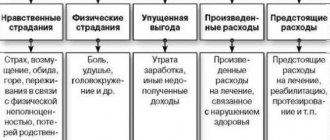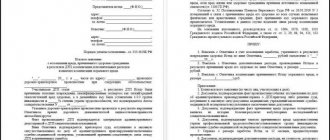In judicial practice, cases related to moral damage are considered the most interesting and at the same time, the most difficult. It is quite difficult to prove that this or that amount is necessary, because it must be justified by many aspects. The complexity of the process lies in the fact that the legislation does not have monetary amounts on which to rely, and even a minimum or maximum is not indicated, so everything depends on the plaintiff. But in practice, when the plaintiff writes a certain amount in the application, relying solely on his own standards, the court either cuts the price to half or does not satisfy the claim at all. Of course, these are shortcomings of the laws, but if you understand the issue in detail, there is a chance to avoid the rejection of your application and receive the necessary amount of money.

What are the types of moral damages?
Despite all the shortcomings of the law regarding moral compensation for damage, the Civil Code of the Russian Federation has defined categories for which compensation for moral damage can be demanded:
- Humiliation of various kinds inflicted on an individual. As well as humiliation of professionalism and dignity in the working environment, if this concerns a legal entity.
- The moral suffering experienced by a person due to damage to his property.
- Moral suffering that a person experiences due to insults to him, close people, family members, and relatives.
- Both physical and mental suffering that a person experiences due to injury to his body, health, and mental state.
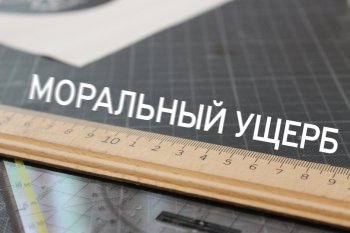
How do we determine the amount of compensation for moral damage?
Currently, issues of compensation for moral damage are regulated mainly by Articles 151, 1099 - 1101 of the Civil Code of the Russian Federation. It is also important for practice that the statute of limitations does not apply to claims for compensation for moral damage (clause 1 of Article 208 of the Civil Code of the Russian Federation). Compensation for moral damage is allowed only in monetary form (part 1 of article 151, paragraph 1 of article 1101 of the Civil Code of the Russian Federation).
From Article 151 of the Civil Code of the Russian Federation it follows that moral harm is physical or moral suffering caused by actions that violate the personal non-property rights of a citizen, or encroach on other intangible benefits belonging to the citizen, as well as in other cases provided for by law.
In paragraph paragraph 2 of the Resolution of the Plenum of the Armed Forces of the Russian Federation dated December 20, 1994 No. 10 “Some issues of application of legislation on compensation for moral damage” it is stated: “Moral damage is understood as moral or physical suffering caused by actions (inaction) encroaching on the property of a citizen from birth or by virtue of law, intangible benefits (life, health, personal dignity, business reputation, privacy, personal and family secrets, etc.), or violating his personal non-property rights (the right to use his name, the right of authorship and others non-property rights in accordance with the law on the protection of rights to the results of intellectual activity) or violating the property rights of a citizen.” However, neither the legislator nor judicial practice reveals an extremely important question: How to move from the specified suffering to the amount of compensation for moral damage?
To answer this question, it is generally advisable, first of all, to define: What is “moral suffering”, what is its essence and impact on a person? This issue causes controversy among legal experts, so A.M. Erdelevsky generally suggests calling moral harm “mental” harm. The amount of compensation is one of the most important and, perhaps, least settled issues. In practice, there are cases when the court reduces the amount of the claimed compensation by 9,000 times, and this means that both victims and the courts do not have sufficiently clear criteria for determining the amount of compensation. I believe that the legislation does not answer the question of the amount of compensation for moral damage. Moreover, it raises more questions than it answers. Thus, Part 2 of Article 151 of the Civil Code of the Russian Federation establishes some criteria for determining the amount of compensation for moral damage: “When determining the amount of compensation for moral damage, the court takes into account the degree of guilt of the offender and other circumstances worthy of attention. The court must also take into account the degree of physical and moral suffering associated with the individual characteristics of the person who suffered harm.” But Part 2 of Article 1101 of the Civil Code of the Russian Federation already names slightly different criteria: “The amount of compensation for moral damage is determined by the court depending on the nature of the physical and moral suffering inflicted on the victim, as well as the degree of guilt of the harm-doer in cases where guilt is the basis for compensation for harm. When determining the amount of compensation for harm, the requirements of reasonableness and fairness must be taken into account. The nature of physical and moral suffering is assessed by the court, taking into account the factual circumstances in which moral harm was caused and the individual characteristics of the victim.” As a result, if we combine the requirements of Articles 151 and 1101 of the Civil Code of the Russian Federation, we obtain the following criteria that the court must follow when determining the amount of compensation for moral damage: - The degree of guilt of the offender / harm-doer; — The degree of suffering associated with the individual characteristics of the person who suffered harm; — The nature of suffering associated both with the circumstances under which the harm was caused and with the individual characteristics of the person to whom the harm was caused (the victim); — And finally, courts must take into account the “requirements of reasonableness and fairness.” These criteria raise even more questions: - What is the degree of guilt? In the resulting suffering? But suffering is clearly individual, associated with the individual characteristics of the person; can the cause be fully blamed for this? — Are the degree and nature of suffering different entities or the same thing? In theory, the term “degree” implies the presence of a certain gradation, such as a high degree, a low degree, but such a gradation must have a certain starting point, and this starting point is unknown. Character presupposes some individual differences within the degree. For example, the second degree of fire resistance of buildings requires either fireproof or fire-resistant outer walls, if they are made of curtain panels, or using the fencing method. That is, the character within one degree can be different. But can this affect the amount of compensation for moral damage if the degree is the same? And what are all the characteristics of moral harm in general, what is their spectrum from which one must choose a certain specific character? — How should the connection between the degree of suffering and the individual characteristics of the victim be determined? Should we say that these characteristics predetermine the degree, or should we be guided by the opposite, that individual characteristics for a given degree predetermine inadequate and therefore not subject to compensation suffering? For example, if a person, after being pricked by a needle, begins to suffer very deeply, should one say that this is abnormal and therefore deny him compensation? And if, having received the same injection, a person simply laughed, should he be denied compensation? And what to do if this person has hemophelia and a needle prick could be fatal for him? — Similarly, how should the nature of suffering be related to the individual characteristics of the victim? Only here there are even more questions, since the concept of “character” is undoubtedly larger in scope than the concept of “degree”. — What kind of individual characteristics are meant, and how should they be proven? Should all individual personality characteristics be described, or only the few that matter? What characteristics matter? — What are the means of proving such criteria as “degree of suffering”, “nature of suffering”, “individual characteristics (in connection with the degree and nature)”? — What are the limits of judicial discretion when applying the requirements of “reasonableness and fairness”? Would it be reasonable and fair, for example, to completely exempt the tortfeasor from payments due to the fact that he gave the victim, who lost his legs as a result of his act, a manual car? And if not released, what should be a fair payment in this case? — And finally, how can all this, all these criteria, be translated into monetary equivalent? What options are proposed for determining the amount of compensation for moral damage by legal authors, and how do they see the answers to these questions?
Among the fundamental studies of the problems of compensation for moral harm, the monograph by A.V. Shichanin “Problems of the formation and prospects for the development of the institution of compensation for moral harm” is known (Shichanin A. Problems of the formation and prospects for the development of the institution of compensation for moral harm. - M.: Yurist, 2003.), work E.V. Smirenskaya “Compensation for moral damage as a tort obligation” (Smirenskaya E.V. Compensation for moral damage as a tort obligation. - M.: Yurait, 2006.), joint work of K.I. Golubev and S.V. Narizhniy “ Compensation for moral damage as a way to protect non-property benefits" (Golubev K.I., Narizhnego S.V. Compensation for moral damage as a way to protect non-property benefits. - M.: Yurist, 2003.). The most active participation in the development of problems of compensation for moral damage was taken by A.M. Erdelevsky, who published several monographs on the topic we are studying (for example: Erdelevsky A.M. Compensation for moral damage: analysis of legislation and judicial practice. - M.: Wolters Kluwer, 2007). M.N. Maleina believes that in the case of physical harm, the type and severity of health damage can be assumed as a criterion for determining the amount of compensation. The specified author sees the criteria for determining the amount of compensation for moral damage in the dissemination of false and defamatory information as a public assessment of the actual circumstances that caused the harm and the area of dissemination of information about the event. (Maleina M.N. Compensation for non-property damage // Bulletin of the Supreme Court of the USSR. 1991. No. 5, pp. 28-29). It is unlikely that these criteria can be considered sufficient, since a closed fracture of a driver’s hand may, after healing, not affect his professional abilities, but for a violinist such an injury will cause complete inability to practice, but for a violinist his profession means several years of life, constant exercise , starting from early childhood. As for the dissemination of false and defamatory information, how can we determine what public assessment this dissemination has caused? And another question: was this assessment actually correct, albeit negative? N. Utyukin proposes to abandon the concept of “degree of harm” altogether and rely on the concept of “form of guilt.” In accordance with this, the author proposes the following gradation: with intentional guilt - 100%, with gross negligence - 50%, with slight negligence - 20%, in the absence of guilt - 10%. (Uyutkin N. Problematic issues of compensation for moral damage in judicial practice // Judge. 2006. N 9. P. 52). I note that this is a problematic proposal. Firstly, percentages from what, from what meter do you mean? Secondly, both within the intentional form and within the careless form there are additional gradations, such as indirect and direct intent, arrogance and negligence, and the specific nature of the act gives rise to additional gradations, often very subtle. Thirdly, what form of guilt will the car repair center have, say, in a situation where a citizen was supplied with a spare part for his car received from the car manufacturer, but this spare part turned out to be of poor quality, and the operating conditions of the car require just such a repair during the warranty period? repair in a specialized center with manufacturer spare parts? In this situation, maybe attract a manufacturer who has 100% wine? But the manufacturer is located abroad, so go ahead and attract him. T.P. Budyakova proposes to distinguish five degrees of moral suffering (Budyakova T.P. Individuality of the victim and moral harm. - St. Petersburg: R. Aslanov Publishing House "Legal Center Press", 2005. - P.44): 1st degree - mild suffering, expressed in ordinary situational moral emotions; short-term and not leaving a deep mark; 2nd degree - suffering of moderate severity, long-term, affecting the mental and physical well-being of the individual in situations that evoke memories of harmful influences, not leading to painful mental changes; 3rd degree - severe suffering, having symptoms of borderline mental disorders, requiring special psychological and psychiatric treatment; 4th degree - especially severe suffering leading to transformation of a person’s personality (mental illness with possible moments of remission or partial awareness of what happened); 5th degree - suffering is blocked by a situation of complete collapse of personality. In principle, this gradation from a medical point of view is certainly justified. However, it raises questions regarding its possible practical application. Let’s take, for example, the 2nd degree of suffering, for one person the duration of suffering took two months, and for another two years, so how will we compensate? Same size or not? Or let’s take the 4th degree, a personality transformation has occurred, but this is a mental illness. How, in this case, does one feel about the fact that one developed paranoia, another developed schizophrenia, and the third “drenched his grief in alcohol” and developed manic-depressive psychosis? At the same time, given that the person has become completely inadequate, how can a cause-and-effect relationship with the harm caused be established (“Doctor, doctor, the patient is laughing all the time, what should I do?” - “Immediately give him an increased dose of an antidepressant!”) At work A.M. Erdelevsky “Moral damage and compensation for suffering” outlines an approach to the quantitative assessment of moral damage. Its essence is as follows: as a basis for determining monetary compensation for moral damage, it is proposed to take a certain basic (or maximum) amount of such compensation, which is then multiplied by several coefficients reflecting the specific circumstances of the case under consideration. These coefficients include: - the degree of guilt of the harm-doer; - degree of guilt of the victim; — coefficient of individual characteristics of the victim; — factor taking into account circumstances worthy of attention. A.M. Eredelevsky proposes to introduce a gradation of compensation for moral damage in relation to the maximum level, which the author defines as 720 minimum wages subject to compensation for serious harm to health. The specified basic amount serves for the subsequent gradation of compensation for moral damage for various acts. This basic level is taken because 6 minimum wages per month for 10 years form exactly 720 (6 * 12 * 10). In accordance with the above criteria A.M. Erdelevsky displays a table of compensation for moral damage, in which, for example: - for causing serious harm to health, compensation is 0.80 relative units (80% of the base level) or 576 minimum wages. - for causing grievous bodily harm committed with particular cruelty, bullying or torture for the victim is 1.00 relative unit (100% of the base level) or 720 minimum wage; - for causing moderate harm to health is 0.30 relative units (30% of the base level) or 216 minimum wages; - for causing moderate harm to health, committed with particular cruelty, humiliation or torture for the victim is 0.50 relative units (50% of the base level) or 360 minimum wage... etc. To take into account the degree of guilt of the perpetrator and the individual characteristics of the victim A.M. Erdelevsky proposes to introduce coefficients: for the guilt of the perpetrator - from 0 to 1, for the characteristics of the victim - from 0 to 2. Also, a coefficient from 0 to 2 is introduced to take into account the characteristics of the situation. To take into account the degree of guilt of the victim himself, a coefficient from 0 to 1 is introduced; this coefficient is used in the form (1-k) since it should reduce the amount of compensation. As a result, it is proposed that the basic level of compensation taken from the table be multiplied by the appropriate coefficients and obtain the amount of compensation for moral damage. Despite all the elaboration of the topic by A.M. Erdelevsky is left with one simple question: To what extent is this technique related to real situations? For example, they took a man out of the loop who tried to hang himself, and found that there was incitement to suicide through the dissemination of false and defamatory information. What is the basic level to take, as for distribution, or as for causing grievous bodily harm? They allowed permanent facial disfigurement during the surgical operation, but actually offered to give him a “new face” as compensation. What is the basic level here? Or, according to the Law “On the Protection of Consumer Rights,” two people make demands for a low-quality product: In one case, a billionaire who demands to replace a low-quality car. In another case, an elderly pensioner, who used her tiny pension, actually her last money that month, bought bread, but it turned out to be moldy. Who should receive more compensation to the one who bought a low-quality car, or to the one who bought low-quality bread, and based on what basic level?
Perhaps we should agree with the old truth that “nothing is worth human tears”! An attempt to introduce a single scale or scale of compensation for any case will certainly fail for a given institution.
Summarizing the above, the authors S.V. Marchenko and N.V. Lazareva-Patskaya in her article “Problems of compensation for moral damage in the mirror of Russian law” write: “Unfortunately, there is no tool for accurately measuring the absolute depth of suffering, as well as for determining their monetary equivalent.” And this is the main problem, without solving which, in principle, all other issues of qualification of moral harm are useless, in fact, “hanging in the air.” However, I believe it is possible to “find” such a tool! The only thing here is that it is necessary to combine efforts in this direction in order to form the necessary judicial practice, and, more importantly, to develop certain expert techniques. Here are the starting points that allow us to say that certainty can be brought to the problem of determining the amount of compensation for moral damage: 1st starting point: In the practice of the European Court of Human Rights, when considering the issue of compensation for moral damage, two criteria are distinguished: - mental suffering of the victim ; - the victim's feeling of disappointment. (See, for example, the Judgment of the European Court of Human Rights of July 21, 2005, the Case of Grinberg v. Russian Federation (complaint No. 23472/03) (First Section), however, this practice is present in many ECtHR Judgments). It is noteworthy that these two criteria can be clearly correlated with the internal and external relations of a person. Thus, the “feeling of disappointment” is actually an assessment of the external environment; by and large, it is a violation of the idea that the world around us is fair and, let’s say, “kind.” What does a “feeling of disappointment” lead to for an individual? Moreover, believing the outside world to be unfair and “evil”, a person will react accordingly to external influences. For example, to the phrase “you're dirty,” an undisappointed subject will smile and remove the dirt, while a disappointed subject will respond with an insult. One will respond with an insult, the other will be disappointed and respond in kind... etc., in the end, what kind of world will we all live in? Thus, this element represents a crisis of external ideas about good and evil. “Mental suffering” can already be defined as a violation of the internal foundations of the individual, a crisis of basic concepts, ideas about good and evil. 2nd starting point: “Stop! - a knowledgeable lawyer will say, “but this is already known and is already taken into account and taken into account quite accurately in legal practice.” Right. These two elements are known from ideas about honor and dignity; they are used quite effectively in cases of protection of honor and dignity. In general, honor can be understood as a social assessment of a person, and this concept expresses how a person strives to look like a correct, good, worthy subject in the eyes of others. That is, we are dealing with an external element. It looks like it, doesn't it? Dignity refers to a person's personal self-esteem. This self-esteem, among other things, expresses how society “returns” to a person his efforts, in which he strives to obtain certain ideas of others about himself. Here we are dealing with an internal element. And again we find similarities. V.G. Koloteva in her work defined the concepts under consideration as follows: “... honor is a public assessment of an individual, a measure of the social and spiritual qualities of a citizen as a member of society.” In addition, “... a person is aware of his position in society and the team. He has self-respect and the need to be respected by others. This internal self-assessment of one’s own qualities, abilities, worldview, one’s social significance is dignity.” A.M. Erdelevsky formulated the concepts of honor, dignity and business reputation as follows: “Honor is a reflection of the qualities of a person in the public consciousness, accompanied by a positive assessment of society; dignity is a reflection of his qualities in one’s own consciousness, accompanied by a positive assessment of a person.” Thus, it should be recognized that jurisprudence, and even domestic jurisprudence, has sufficient legal tools that make it possible to determine at least the very situation of discrepancy between personal ideas about good and evil, as well as ideas about the surrounding morality, in which it is revealed that we now they have come to call it “moral damage.” This toolkit allows us to identify the very fact of the occurrence of moral harm, which is expressed in: - a person’s disappointment with the morality surrounding him, the significant actions of other people surrounding him, which this person, as a result of disappointment, evaluates as predominantly, or largely, immoral, dishonest, that inevitably leads to the corresponding response behavior of the victim himself, as well as to his experiences; - mental suffering of a person, which is caused by the fact that an unworthy social environment also requires unworthy one’s own behavior, “Since evil is possible, it is not punishable, then why be ashamed?”, and this causes internal suffering, since such behavior must clearly conflict with normal ideas of a well-behaved person. We see the same honor and dignity, but in a negative form, honor has become dishonesty, and dignity has become unworthy. So, we find ourselves in the area of personal assessments of a person, where a person evaluates the social environment and, according to these assessments, selects his own appropriate behavior. But this leads us to the third starting point, to social adaptation. 3rd starting point: Here an expert must clearly enter the arena. But first, I’ll give a quote: “Social adaptation is of great importance for a person, the result of which is the adequate inclusion of a person in the social environment around him, bringing his behavior into line with the system of norms and values accepted in society. The degree of social adaptation is different and depends on gender, age, type of nervous system, general physical and emotional state, fitness, etc. The importance of adaptation especially increases with a sharp change in the human sphere of activity and environment (for example, when changing place of work, residence, when a teenager becomes a teenager). into “adult” life, etc.). Disorders of social adaptation can often be the causes of neuroses, autism, alcoholism, and drug addiction.” (Anatomy, physiology, human psychology. A brief illustrated dictionary / Edited by A.S. Batuev. - St. Petersburg: Peter, 2005, p. 5) So, the question is simple: Or are we all a worthy society, and then we should reproduce and to maintain appropriate ideas about morality, about honor and dignity, accordingly, one should also compensate for moral damage, so that the violated ideas return to normal. Or we are not such a society, morality has no value for us, and violating the ideas of good and evil of some “little man” simply does not matter. This dilemma, I believe, is where the problem of the amount of compensation for moral damage lies. This dilemma simply and clearly allows us to put forward the principle of such compensation: The amount of compensation for moral damage must be sufficient to ensure that the resulting feelings of disappointment and mental suffering are eliminated. Thus, the amount of compensation should be such that a person can simply live a sufficient and decent life in the current social situation until all the discrepancies caused by the violation are “removed.” At the same time, we clearly understand a good, decent and worthy life differently. For some, it's traveling and communicating with people. For others, it means buying educational games and toys for children and activities with the family. For others - a vacation in a sanatorium. I believe such ideas should also be taken into account. Accordingly, the adaptation period and period will be different, and different amounts of compensation for moral damage will be required. But then, apparently, it’s up to psychologists. The section of psychological adaptation of personality is highly developed in modern psychological science. The causes and nature of stress and their consequences for the individual are identified. The very doctrine of social adaptation of the individual has been developed in detail. There are ideas about mismatches and ways to eliminate them, developed by cognitive psychology. Profound mental disorders are also known to psychiatry. Based on this knowledge, I believe it will not be difficult to determine both the nature and depth of the mismatch itself - disadaptation, and the time for restoration of adaptive abilities, as well as the cost and order of adaptation measures.
The authors of this article would like their colleagues involved in jurisprudence to take on board the thoughts set out in the article and, in collaboration with expert psychologists, begin to “storm” the issue of the amount of compensation for moral damage, which, as it turns out, is not impenetrable or incomprehensible.
How to determine the amount of moral damage
Of course, determining the amount of compensation for moral damages will not be easy. Experts often recommend going to a psychologist to get an opinion on the state of your mental health. A psychologist can describe in detail how much a particular situation has harmed his patient and determine how what happened will change his life in the future.
In court, you can ask a specialist who works with victims and who can help determine how much recovery his patient needs to receive. After receiving the conclusion, the lawyer, based on the laws of the Russian Federation, will be able to determine the required amount and draw up a claim, which the court will actually consider and take into account.
In addition, the Russian scientist has patented a special technique, thanks to which such issues can be resolved quite easily. He determined that if moral damages are necessary due to the fact that human health has been damaged, then the defendant must pay at least 720 minimum wages in order to provide the victim with everything necessary for the next 10 years. For a long time, the court actually relied on a similar technique, but, unfortunately, in 2016 this technique was excluded from the official register. Some lawyers still ask their clients to use the method as one of the options in order to achieve the desired answer in court.
The court must ask for documentary evidence that moral damage has been caused. This could be photo or video facts, notes and other possible evidence. You need to understand that words alone will not be enough.
Lawyers recommend specifying the highest possible amount of moral damages, given that the court can cut it to half or even more. In addition to considering the evidence, the judge also evaluates how badly the plaintiff suffered. The offenses specified by the defendant are also taken into account, whether physical suffering was specified or only mental, and how much the plaintiff will suffer in the future due to the moral damage inflicted on him.

In what cases is compensation due?
A person has the right to expect compensation if he has suffered mental or moral suffering. The perpetrators are encroaching on his moral rights.
Condition of compensation: violation of property rights by the culprit. If harm is caused by actions or inactions that violate these rights, compensation occurs under Art. 1099, paragraph 2.
It is important that moral damage is subject to compensation regardless of the presence of damage of a property nature (Article 1099, paragraph 3, Article 15 N2300-1 of the Federal Law).
Moral damage is compensated for infringement of non-property (personal) rights. The Civil Code of the Russian Federation contains a number of articles that serve as grounds for going to court and collecting monetary compensation from the culprit. In addition, sectoral laws contain provisions that are grounds for seeking help from the court and collecting certain amounts of money from guilty citizens.
Legislative actBase
| 1123 | the secret of the will became known to third parties |
| N38-ФЗ | violation of the legitimate interests of persons due to the distribution of advertising of an inappropriate nature |
| N152-ФЗ | violation of rights in the field of personal data |
| N149-ФЗ | violation of rights and legitimate interests in connection with the disclosure of information with limited access for third parties |
| N132-FZ from 1996 | violation of contract clauses related to the sale of a tourism product |
| N2300-1 Federal Law from 1992 | violation of consumer rights by the manufacturer, manufacturer, seller of products and services |
| Resolution of the Supreme Court of the Russian Federation of 2020, number 18 | violation of the right of citizens who live indoors to a favorable environment without the harmful effects of tobacco, as well as the consequences of its use by citizens living in the neighborhood |
Conditions under which liability arises:
- Guilty actions of a person.
- The responsibility to prove the existing harm lies with the person who is recognized as the victim.
- The victim has the right to demand compensation for moral damage in any amount. The court is obliged to establish the amount of monetary payments based on the following:
- the offender's guilt;
- level of human suffering;
- the beginnings of rationality and justice.
Moral damage to the consumer
When purchasing any product or service, we automatically become nothing more than consumers. And in this case, our rights and interests are protected by the law “On the Protection of Consumer Rights”.
According to it, if the guilt of the seller or performer is established, it is possible to recover moral compensation for damage caused as a result of violation of consumer rights such as: violation of the terms of the contract, non-compliance of the product with its purposes or its inadequate quality.
Special attention should be paid to the public services provided to us. Nowadays, in most cases, they are not provided entirely in accordance with current legal standards.
Ensuring the provision of necessary public services to the tenant, carrying out routine and major repairs - all this is also regulated by the above law. It follows that the employer, whose rights have been violated, has the right to demand compensation for moral damage.
Be sure to read it! Sample power of attorney for the sale of an apartment in 2020
Moral damage due to the actions of the employer
According to Art. 237 of the Labor Code of the Russian Federation, moral damage caused to an employee as a result of unlawful actions or inaction of the employer is subject to monetary compensation in the amounts established by the employment contract.
This article provides for the possibility of compensating for moral damage both for violation of non-property rights and for violation of property rights, such as delays or non-payment of wages.
If controversial issues arise regarding the compensation itself or its amount, they will be resolved directly by the court. And his decision will not depend on material damage, which is also subject to compensation.
The court has the right to compensate the employee for: physical and moral suffering due to illegal dismissal, transfer to another place of work, unjustified application of disciplinary action against him, unjustified removal from work, refusal to transfer him to another place even for medical reasons, failure to issue him a work book upon dismissal and others.
Unlawful actions of authorities
According to Art. 1069 of the Civil Code of our country, damage caused to individuals. person or legal entity a person, as a result of an illegal action (or, conversely, inaction) of any state bodies or local government, or individual officials working in such bodies, is subject to compensation.
The compensation itself is paid from the treasury of the Russian Federation, its constituent entity or municipal institution. An example of such a violation could be the illegal actions of bailiffs.
Moral damage due to criminal prosecution
Art. 133 of the Code of Criminal Procedure, which gives the right to rehabilitation, contains the possibility of compensation for material damage, and the elimination of the adverse consequences of moral damage caused, and the restoration of the victim in his rights (housing, pension, labor, etc.).
Compensation for moral damage caused as a result of criminal prosecution is made in full by the state and in no way depends on the guilt of the court, investigator, prosecutor or interrogator.
The right to compensation of this kind is available to both those unlawfully convicted and only those accused of a criminal act who have been unlawfully subjected to criminal prosecution.
Moral damage due to a criminal act
If your non-material rights or other non-property benefits are infringed, as well as their direct violation, you can also count on moral compensation. As we said earlier, this follows from the very definition of moral damage.
This may include such criminal acts against you as: violation of confidentiality of correspondence or medical confidentiality, insult, harm to your health, rape, illegal deprivation or restriction of your freedom. In this case, the claim can be considered in both civil and criminal proceedings.
In case of an accident

In addition to compensation for material losses in an accident, you can also try to obtain compensation for moral damage.
The harm caused to a person as a result of an accident has a material and non-material basis. Analyzing the non-property component is more difficult than, for example, material damage in an accident.
In order for the court to issue an adequate amount of compensation payments, it is necessary to present the fact of the accident and establish the degree of guilt of all participants in the accident. And also understand the severity of the moral suffering of the victim.
In case of violation of consumer rights
Moral damage is caused to the buyer who purchases any goods. And also to the customer who uses the goods and services. Cases where harm occurs may include the discovery of significant defects in a product. Because of this, the person can no longer use the purchased item. And also in a situation where the use of a product of inadequate quality has caused harm to human health.
Moral damage due to a dog attack or bite
Certain breeds of dogs, such as guard or fighting dogs, are classified by the judicial authority as objects that pose an increased danger. So, if you are attacked by a dog of one of these breeds, you can count on compensation for the damage caused to your health and the moral damage that arose as a result.
Insult to honor and dignity
If defamatory rumors that are untrue are spread about you, you can also receive a small monetary compensation. But, if you are not some kind of official, then the amount of compensation for moral damage will be so small that in some cases it is not even worth getting involved in a lawsuit just because of it.
What must be proven to recover moral damages?
As has already become clear, there is no specific algorithm of actions for obtaining compensation for moral damage. But still, according to the latest changes in the laws of 2020, circumstances are indicated that must be proven without fail.
- Moral injury. The fact that it was actually applied is necessary.
- It must be proven that the defendant actually acted unlawfully. A special role in the amount of compensation is played by the fact whether the accused acted on purpose or whether it was just an accident.
- Causal relationship.
- The guilt of the person who caused moral suffering.

What are moral damages for?
The award of a penalty is possible in case of violation of the non-property rights of citizens. The victim may be awarded compensation for moral damages for:
- the emotional pain experienced in the event of the loss of a relative;
- physical pain from injuries and stress;
- acquired disability and, as a consequence, loss of normal life activities;
- deterioration of psychological state;
- job loss;
- slander, insults;
- disclosure of family, private, medical secrets;
- violation of confidentiality of conversations or correspondence.

Road accidents and moral damage
Most often, moral damages are recovered after an accident. The courts know a lot of cases where the amounts of moral penalties were too high and were reduced by judicial procedure to 90%.
In case of an accident, a lot of nuances are taken into account. For example, if an incident occurs with a pedestrian, it is taken into account where he crossed the road and what condition he was in when he did so. If the investigation established that the pedestrian crossed the road in the wrong place or was drunk, the amount of moral damages will be minimal, but will still be assigned.
If an accident occurred between two cars, the adequacy of the drivers who were driving, the reasons why traffic rules were violated and the injuries, both moral and physical, that were inflicted are taken into account. In such cases, the amounts of compensation can be quite high, up to the maintenance of the victim for many years.
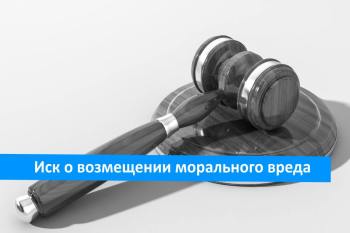
How moral damage is compensated
Moral damage may be subject to recovery under the criminal code and then the plaintiff must contact the investigator leading the case. It is the investigator who will be able to explain in court why moral damages are necessary in the specified amount. Or, collection occurs according to the civil code and then the plaintiff relies solely on his own strength or can involve a lawyer.
In cases of independently collecting evidence, it is necessary to attract witnesses. They can be relatives, colleagues or neighbors, as well as eyewitnesses of the incident. In addition, opinions from either a psychologist or psychotherapist are required.
You also need to remember that if the case of moral compensation is carried out under the criminal code, then the state fee is not paid. But, if compensation for moral damage is carried out according to the civil code, then from the specified or won amount it will be necessary to pay interest to the treasury. In practice, lawyers are trying to prove that payment of state duty for non-property compensation should not be withdrawn, but such cases have never been won in the Russian Federation.
The only case for which the state fee is not paid is a violation of consumer rights.

Damage assessment
It is important to learn how moral damages are calculated. This is a very labor-intensive task. The final decision on this matter is made by the judge, but the plaintiff is obliged to indicate in the application what amount he expects. The main advice from legal practitioners is that the payment specified in the application should not appear as if the applicant is hoping to improve his well-being in this way. The amount indicated in the claim must be as adequate as possible and reflect the suffering suffered by the victim.
When resolving such an issue, it is best to discuss the amount with an expert who has been repeatedly involved in such cases. We must not forget that, theoretically, the consideration of the case could end in favor of the defendant. One more point: according to the Civil Code, compensation can be provided exclusively in monetary form.
Deadlines for payment of moral damages
There is also a hole in this clause of the legislation and, under special circumstances, the court may give the defendant an installment plan or defer compensation for payments for up to 1 year. In cases where a person was injured or died and the family needs payments in order to be able to exist, the court will force the defendant to pay the entire amount within a month.
As for the payment procedure, the court decision comes into force 5 days after its conclusion. The plaintiff receives a letter of claim and sends it to the enforcement service in order to speed up the process of resolving the issue.
Also, the plaintiff and defendant can come to an oral agreement on payment of damages and agree on exactly how payments will be made. Naturally, a settlement agreement must be registered in court, so the agreement must be concluded before the court decision and attached to the case.
In addition, it must be remembered that if compensation for moral damage does not occur on time, you can file another claim and ask for compensation. Of course, the process will be long and tedious, but every person has the right to this.
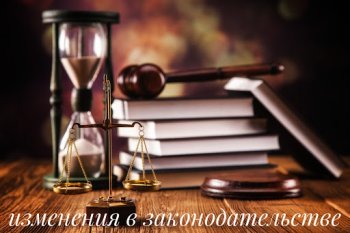
How to collect compensation: procedure and documents
Before filing a claim, it is necessary to find out whether the victim has sufficient grounds to open legal proceedings. Not every case can be regarded as moral damage, so it is better to consult a qualified lawyer to clarify the situation. It is also important to determine whether the moral damage caused was intentional or was caused through negligence. It is important for the victim to analyze in advance whether he can really prove that he had to experience moral suffering. As evidence, you will need to attach certificates from doctors, witness statements and much more to your application.
Important! It is advisable to use the services of a lawyer in the first stages of the case, since he can help you correctly draw up a claim and collect all the necessary documents. But it is worth remembering that the results depend entirely on the level of guilt of the defendant.

Before filing a claim, you can try to contact the culprit directly. It is better in writing, by sending him a claim, which will describe in detail all the details of the case, by mail. It is worth additionally indicating in the complaint that if the requirements are not met, a lawsuit will be filed against the culprit. If the situation cannot be resolved peacefully, only then should the victim open a lawsuit. He has the right to file a claim or petition at any time, since the statute of limitations does not apply to claims of this type, taking into account paragraph 1 of Art. 208 Civil Code of the Russian Federation.
An application must be submitted to the court at the residence address of the perpetrator, and if harm was caused during a crime, you should apply to a regional court. It is extremely important to clearly draw up a statement, which should detail all the grounds for payment of monetary compensation. Compensation must be paid by the perpetrator, and if it is the person who acted in the execution, responsibility for his actions will fall on the government agency or organization in which he works. The victim will need to pay the state fee and collect a full list of documents, which includes:
- A correctly drawn up and completed application according to the sample, where you need to indicate information about the plaintiff and defendant, details of the judicial authority, justification for the harm caused, as well as the amount of recovery.
- Certificates confirming the incapacity of a child or adult for a certain period, sick leave certificates and other similar documents.
- Articles in the media about the incident, if available, personal correspondence, photographs, if moral damage is compensated due to the death of a relative.
- An act of medical report, if the victim was beaten, damaged, or criminal acts were committed against him.
- Written statements of witnesses and other evidence that can be presented to the court.
- Victim's passport.
- A document that confirms the fact of damage to health.
- A receipt confirming the paid state duty.
Rules for drawing up an appeal to the court
Now let’s figure out how to properly file an appeal to the court and who has the right to do it. First of all, it is important to note that only an individual has the right to demand compensation for non-material damage. Legal entities (organizations) cannot suffer moral damage, which means they cannot count on payments.
The application itself is submitted in accordance with the general procedure and must comply with the requirements of the civil process. This means that this statement of claim has no special features.
Remember! Sometimes it is possible to resolve everything out of court, when both parties agree to a certain amount as compensation for moral damage. But this is often an exception to the rule, which is why the vast majority of cases are considered by the court.
An application can be submitted even if the defendant has already compensated for material damage. This is sometimes even an advantage, because payment for moral damages is confirmation that the defendant admits his guilt.
As already mentioned, the Civil Code of the Russian Federation interprets moral harm as the infliction of physical or moral suffering on a person. This means that in order to receive payment, it is necessary to prove not only the guilt of the defendant, but also prove the fact of the suffering he caused to the plaintiff.
Attention! Judicial practice shows that all decisions are made on the basis of fairness and reasonableness. This means that the amount claimed in the application must be reasonable. It is justified not only by these two signs, but also by proof of the degree of guilt and the suffering suffered.
Let's consider the list of requirements that are put forward for the statement of claim:
- The text of the statement must be reasoned. The arguments must be weighty, this could be witness testimony or documentation;
- The application is drawn up according to the sample. You can’t just write your requirements; everything must be in accordance with office work standards. To correctly draw up an application, you can contact a lawyer or ask a government agency for a sample;
- The text of the application must be written correctly and legibly. The text should not contain errors, corrections, strikethroughs, etc. The text is written legibly so that everyone reading the statement can understand all the information. The application can be submitted in printed form;
- It is prohibited to use curse words, insults, etc. in the text.
Having understood the basic requirements, you can go to the sample, which should include the following information:
- Full name of the judicial authority to which the claim is filed;
- Details of the judge who will hear the case. This information can be found directly when submitting an application;
- Full passport details of the person submitting the application (plaintiff);
- Full passport information about the accused (defendant). If it is not possible to indicate all the data, you should enter everything that is known about the person;
- Cost of claim. This is the amount that the defendant wants to receive for the harm caused to him;
- Title of the document;
- A detailed description of the circumstances under which the offense was committed;
- Form of expression of damage. For example, this is property and non-property damage;
- Evidence available to the plaintiff;
- Results of examinations, if any;
- List of documents that are attached to the claim (applications, medical certificates, acts);
- Date of application and signature.
When filing a claim, two copies are drawn up, one of which is given to the judicial authorities, and the second remains with the applicant.
Proof
In addition to witness testimony, the following documentation may be used as evidence:
- an article in the media in which, for example, false information about you was published;
- a certificate of incapacity for work issued due to damage to your health by another person;
- results of an independent forensic medical examination;
- personal correspondence or family photos, if you want to compensate for damage due to the loss of your relative;
- other papers that can be used as evidence of moral damage suffered by the plaintiff.
What to consider when filing a claim
Let's look at a list of important points to pay attention to:
- Pre-trial resolution of the conflict. You should try to resolve the conflict without bringing the matter to court, by directly contacting the offender. Only if there is no answer or it is negative, you should go to court. Confirmation of an attempt to pre-trial resolve the conflict is attached to the claim;
- There is no statute of limitations on filing a claim;
- The application should be submitted to the district court at the defendant’s place of residence. If a crime has been committed, then to the regional court;
- The offender (defendant in court) is an individual or a person “in execution.” To put it simply – the state;
- The state fee when submitting an application is always paid, there are no exceptions for anyone;
- The period for payment of compensation is determined in court, depending on the financial condition of the defendant.
Changes in laws 2020
Since cases of compensation for moral damage are becoming more frequent, and there are no exact laws, it was decided to change and supplement clauses in the law of the Russian Federation that will help facilitate evidence or help defend oneself in court.
Today it is known that by the end of the year the government wants to create a special commission and experts who will deal specifically with cases of moral punishment. Experts in this field will help determine the actual amounts of money needed by looking at the situation objectively. Lawyers support this government initiative, since relying on the laws to prove that their client is right will become much easier. We can only expect such changes and hope that in 2021 it will become much easier to recover moral damages.
A look into the future
According to experts, it is even possible to develop a computer program: you enter data, it produces recommended numbers from start to finish.
In any case, the output cannot be a rigid number; there must be a fork with an upper and lower limit, but even in this case, the judge will have the right to assign a size higher or lower, experts explain. – But the court must motivate its decision.
A judge can also use the system, but this will most likely require some legislative changes, or representatives of the parties and experts, and the results of computer calculations can serve as a justification for why the parties require a particular amount as compensation.
As Irina Fast emphasized, the Supreme Court can also solve this situation by approving by a special act the criteria for recovery, based on the practice of the European Court of Human Rights.




